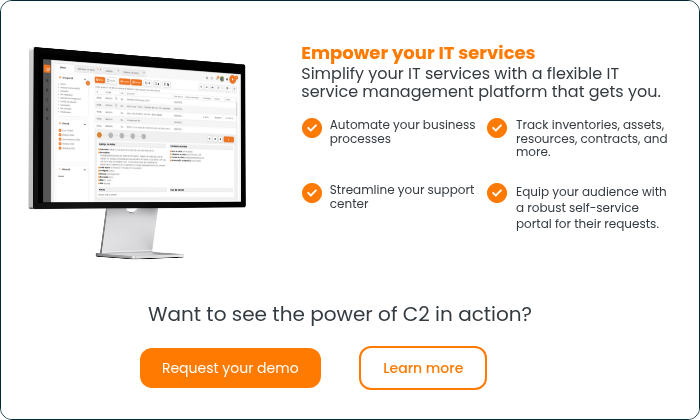One of the only constants in the business world is change. Companies are connected through their people, processes and technologies to so many external forces that inevitably, a change outside your control will impact your company. And, of course, even a planned internal change can have major, unforeseen consequences. All we can do is plan and make our organizations as flexible and resilient to change as possible.
One of the most important ways businesses can make themselves flexible and resilient is by reinventing how they do IT. Information technology has become the platform on which all business runs. Reinventing IT so it can scale and adapt to whatever the world throws at your company will help you survive drastic change and thrive in it.
Here’s why businesses need to embrace change, plan for it, and what business IT processes should look like in a flexible, adaptable organization.
Recent years have shown us we need to embrace change
In recent years, climate change, unrest, volatile business markets, and of course, the COVID-19 pandemic have all shown us that businesses need to be able to survive major, unexpected external change if they hope to thrive. Moreover, businesses must accept that major upheaval might be the new normal for the next few decades.
At the same time, we still need effective strategies for handling more routine organizational changes. For example, we can’t reinvent how our businesses operate using a hybrid workforce without having plans to manage things like new hires, performance issues, budget cuts and other common organizational matters.
To become more adaptable, our businesses need to:
- Plan for change
- Improve core operational components
- And embrace new forms of information technology
Plan for change
Reinventing IT and planning for change requires buy-in from all levels of your organization. You can’t just push from the executive level, and you can’t push from the ground level only. Initiatives at both ends are valuable but must occur together in concert.
That means communication is vital to get everyone in your organization rowing in the same direction. A major change will impact every business unit differently, and each unit will know how that change will affect them and what resources they need to weather it effectively. IT service management software can help you coordinate all those change functions in one unified environment that keeps everyone on the same page.
Improve core operational components
With your organization aligned and in communication, next you need to think about how change will affect your three core operational components: your people, processes and technologies.
People
Think about how changes will affect your workforce. For example, in the wake of the COVID-19 pandemic, going forward, most organizations will continue to have a hybrid working environment with some staff on site and others at home at any given time. Will proposed organizational changes affect those groups differently?
Losing essential skills and knowledge is one of the most common ways changes in personnel negatively impact businesses. Create a cross-training program or build cross-training into your day-to-day operations. Maintain an internal knowledge base, too, so critical information has a place to live other than inside someone’s head. If someone gets sick, goes on vacation, or leaves the company, you must ensure their knowledge and skills are still available.
Processes
You don’t want your business processes disrupted by major organizational changes, and you especially don’t want to be surprised when they break down unexpectedly. To stay resilient, think about what processes can be automated so they’re not dependent on individual workers who may or may not be available on any given workday.
Think about what you can track with automated software systems or convert into a software-driven workflow. That not only makes your organization more resilient to change but it also makes its business processes more cost-effective.
Technologies
Increasingly, technology has come to drive almost all business operations. Think about how major changes might disrupt the technology you use, specifically about what workflows and insights wouldn’t be available if a given piece of information technology would stop working during an organizational change. For example, if you’re tied to old, on-premises infrastructure, now may be the right time to plan a migration to more resilient cloud-based services.
Embrace new forms of IT that unify those components
IT service management (ITSM) can help you manage your organization’s core components. ITSM is a set of business practices that involve structuring information technology into service packages that your company delivers to customers. Those customers can be external, like traditional paying customers, but under an ITSM framework, a ‘customer’ could just as easily be another department within your organization.
ITSM software often includes formal change management functions to manage planned changes to your organization and incident management functions to handle unexpected issues you might face. ITSM change management practices aim to ensure that any planned change happens according to plan and has a positive, lasting effect on your organization. The goal of incident management is to ensure that your team addresses an incident quickly, resolves it completely, and any actions taken are fully documented so the incident can be reviewed and understood.
Data collection underlies all processes within ITSM, which is why it’s important to use reliable ITSM service desk software, like C2. ITSM software ensures that everything you can know about how your business operates is known and tracked within the software.
Reinventing IT with C2 ITSM
ITSM can revolutionize how your organization manages its IT and manages organization-wide changes. If you see change in your organization’s future, then now is the time to think about an IT service management platform that can power your business.
C2 is an all-in-one IT service management platform that helps your teams reinvent how they do IT. Using it, they can better manage change, collaborate and deliver better service. It’s a cloud-native, codeless solution that is easy for organizations with any level of resources to use.





